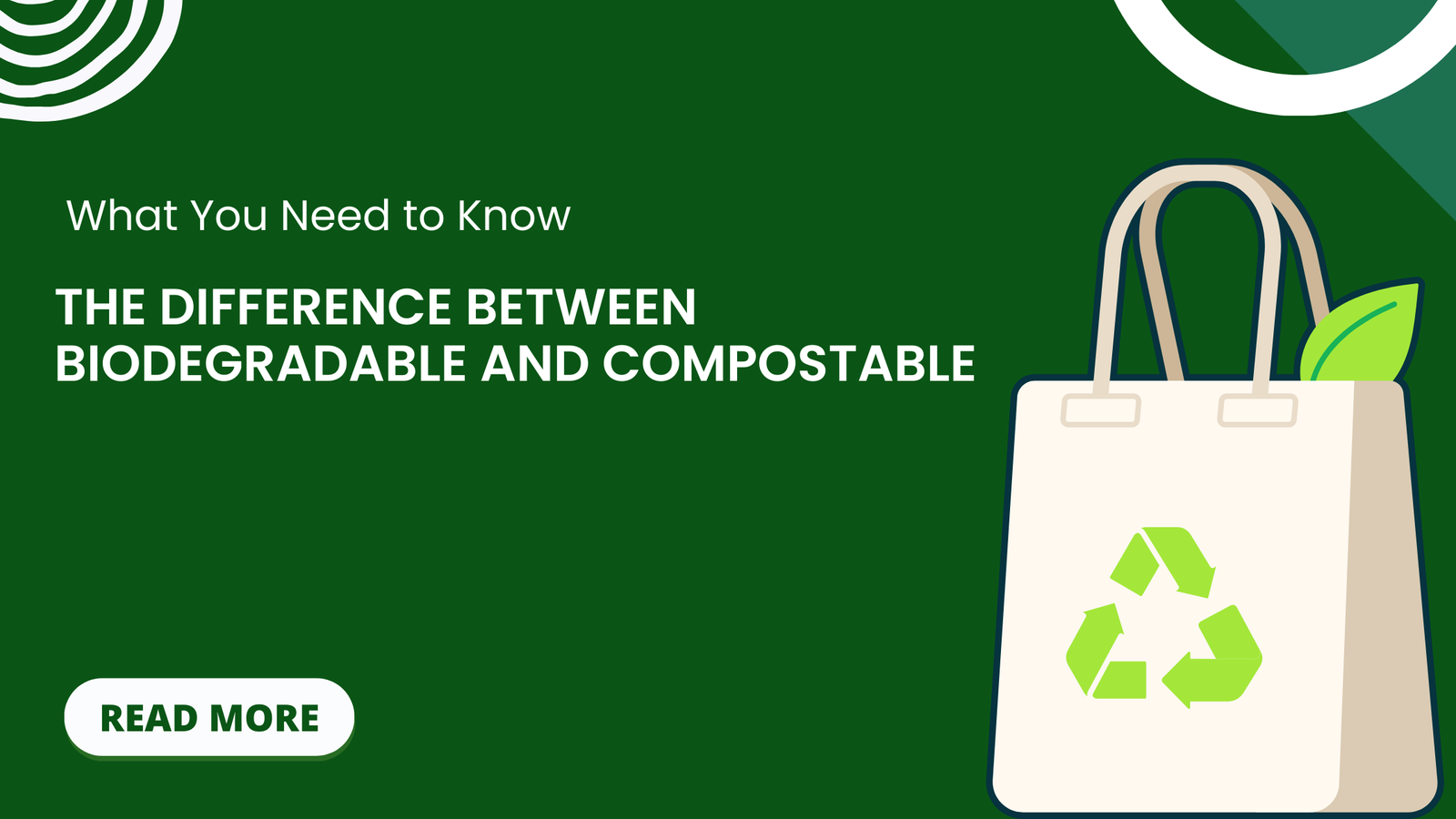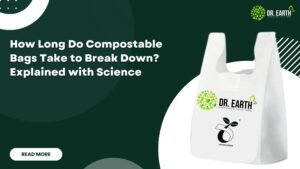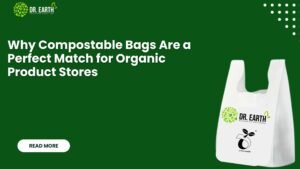
The message to conserve the earth can hardly have been deliver with any greater concerns today. Today in the world, many individuals are looking for functional techniques to lower the emission of greenhouse gases and make the world environment better. Another of the basic measures one can take is an eventual substitution of regular bags with environmentally friendly ones. Such replacements to the conventional plastic bags reduce the negative effects that human beings have on the environment, endorse sustainability, and preserve resources.
At Dr. Earth, we recognize and understand the need for environmentally friendly bags and hence our biodegradable bags and compostable bags for use. This blog focuses on the different ways that eco-friendly bags are beneficial to the environment and how they can reduce your carbon footprint in your everyday life.
Understanding Carbon Footprint: What It Means and Why It Matters
A carbon footprint is therefore the sum total of total emissions of greenhouse gases in terms of carbon equivalent that is from human activities. Such emissions are the main cause of climate change, which results in more instances of extreme weather, increased sea levels and the loss of species.
Manufacturing of plastic is among the biggest sources of emissions around the world. Single-use nylon bags affect greenhouse gases in their manufacture, transport and disposal and thus have a lasting effect on our environment. Using environmentally friendly bags can in fact lower such emissions, besides contributing to minimum carbon footprints in society and ushering in a new environmentally sustainable age.
Why eco-friendly bags matter
Biodegradable bags and compostable bags are classified as environmentally friendly bags to the traditional plastic bags. While it takes hundreds of years for plastic to degrade, eco-friendly bags are made to disintegrate within a short time and in a safe manner, thus eliminating the amount of waste that gets dumped in landfills and seas.
Here’s why eco-friendly bags are a superior choice:
- Biodegradable Bags: These bags are made from natural substances such as cornstarch and unlike the plastic bags, these disintegrate naturally, causing little harm to the environment. Biodegradable bags are a good choice for consumers that would like to try the reusable bags but do not want to harm the environment.
- Compostable Bags: Compostable bags can be differentiate from biodegradable bags since, while the former degrades under certain conditions, compostable bags turn into non-toxic substance in composting conditions. These bags are non-toxic and do not deposit certain residues and hence they are suitable for environmental waste disposal of organic waste.
With these types of bags, you have the capacity to help bring a solution to the issue of plastic pollution as well as the reduction of greenhouse gas emissions.
How Eco-Friendly Bags Reduce Your Carbon Footprint
Switching to eco-friendly bags has several benefits that contribute to a reduced carbon footprint:
1. Reduced Emissions from Production:
Biodegradable as well as compostable bags used in the production are easier to produce as they use half the energy as utilized in the production of the ordinary plastic bags. Standard polythene bags are manufactured using fossil fuels, which are not sustainable in that they require a lot of energy to produce and their production is associated with high carbon emissions. On the other hand, biodegradable bags have their source from renewable resources and hence have minimal energy required during their creation, hence fewer emissions.
2. Lower Waste in Landfills:
This way, we can also be sure that eco-friendly bags also help to minimize the amounts of waste that is produced and ends up in a landfill. Biodegradable bags and compostable bags can decompose within several months to just a few years of time; this is unlike plastic bags, which take over hundreds of years of time to decompose. This fast degradation helps in minimizing wastes dumped on the different dump sites, thereby decreasing methane production, a potent greenhouse gas resulting from the anaerobic breakdown of organic matter.
3. Minimized Pollution of Oceans and Waterways
Impacts of conventional polyethylene bags include pollution of water sources and aquatic wildlife, with plastic bags being mainly sighted in seas and water bodies. Honestly, through the use of eco-friendly bags, you can be able to minimize or, in fact, contribute to the number of bags that find themselves in these surroundings. For this reason, biodegradable and compostable bags decompose faster and do not contribute to environmental pollution and carbon emissions, especially on bodies of water for instance, during cleanup exercises.
4. Encouraging sustainable practices:
Using eco-friendly bags ensures that society moves away from using the existing bags, which are non-recyclable. The use of biodegradable and compostable bags means that you are applying pressure. on businesses and the government to seek out environmentally friendly products. This sort of action can contribute to changes that would bring about a decrease in the total carbon footprint.
5. Support for a Circular Economy
Eco-friendly bags are non-laable and thus comply with the circular economies, which entail products that should be reusable, recyclable, or compostable upon expiry. This leads to reusage of virgin materials, hence reduced waste practices as well as conserving resources, hence a lower carbon footprint.
Simple Steps to Incorporate Eco-Friendly Bags into Your Routine
It can be seen, that the transition to the usage of eco-friendly bags does not present much difficulty and can go a long way in saving the environment. Here are some practical steps to incorporate these bags into your daily routine:
1. Start with Small Changes:
To start with, switch to biodegradable or compostable bags depending on the activities to be accomplished, such as shopping or storing food substances. As soon as possible, dispose of all the single-use plastic bags inside your home and replace them with a more environmentally friendly counterpart.
2. Keep bags accessible:
It should be made a practice to possess a reusable bag each time one is outside. Make sure that you have foldable bags and make it a point to keep them in your car, purse or backpack so you can use them anytime when you shop. The closer the bags are located, the higher the chances of using them are.
3. Choose the right bag for the right purpose.
There should be different forms of the eco-friendly bags to suit the various needs that people have. For instance, select durable bags for use in transportation of food items such as groceries, thin degradable bags for use in shopping and American-sized bags for culinary and organic waste products.
4. Encourage Others:
Encourage friends, families, and even other people that you meet on a daily basis to embrace this new trend of using environmentally friendly bags. Spread the word on why throwing nylon bags and using eco friendly, biodegradable and compostable bags is important and help others to act.
5. Support brands committed to sustainability:
In as much as is possible, try and buy organic brands such as Dr. Earth that practice sustainable agriculture. Purchasing products from the companies that have taken responsibility for their impact on the environment in mind will create demand for the environmentally friendly products.
The Long-Term Impact of Using Eco-Friendly Bags
Exchanging bags that are environmentally friendly is beneficial not only to the environment but also results in a change in the culture of society. Here are some of the long-term impacts of choosing biodegradable and compostable bags.
1. Reduction in greenhouse gas emissions:
In the long run, the use of environmentally friendly bags can significantly reduce the greenhouse gas emissions that are attributable to production, transportation, and disposal of the plastic bags. If more consumers use the biodegradable and compostable bags then fewer and fewer people will use plastic bags, meaning that the carbon footprint for the processes of making these bags will reduce exponentially.
2. Decreased landfill waste:
Since the use of eco-bags prevents landfilling, there will also be few emissions of methane and other greenhouse gases. This has led to improvements to the environment and better ways of dealing with waste through management.
3. Preservation of Natural Resources:
Carrying a bag saves a lot of oil, water and energy that have been use to produce plastic bags, for instance. Thus, through the consumers’ use of biodegradable and compostable bags, they are still able to conserve these resources for future generations.
4. Healthier Oceans and Wildlife:
Plastic bags take longer to degrade than biodegrade; use of few or no bags at all will reduce the chance to endanger the lives of sea creatures and disable natural systems. This means that the wear and tear of eco-friendly bags is higher as they decompose more often, thus decreasing the chances of wildlife ingesting them or getting entangled in them, making the oceans and waterways healthier.
5. A Culture of Sustainability:
Encouraging the use of eco-friendly bags ensures that consumers practice what is known as purchasing with conscience. Such a change in culture may lead to other changes in consumer behavior that will translate to a decrease in the overall levels of carbon emissions in an economy.
Conclusion
Eco-friendly bags are one way that we can help the environment and cut down our carbon footprint and this is one major goal that should be achieved. Biodegradable bags and compostable bags are available and they make it possible to reduce the emission of greenhouse gases, save on resources and have a cleaner environment through the reduction in the disposal of plastics.
At Dr. Earth, we have taken the initiative to provide a wide variety of reusable bags that will help our customers make ecological decisions for their packaging while being attractive, durable and easy to use. With that remark, I look forward to the day when the campaign will assure us that we are making a difference, one bag at a time.
FAQs
Q-1: In what way is it possible for eco-friendly bags to decrease my carbon footprint?
Ans: Organic bags are less energy-intensive, utilize fewer inputs in their production, have lower production waste levels and biodegrade at a faster rate than plastic bags, thus having a lower carbon footprint.
Q-2: What kind of material is the most suitable for the environmentally friendly bags?
Ans: Biodegradable and compostable bags should be use since they are eco-friendly, decompose quite well with the formation of toxic byproducts, and help to minimize acts of littering.
Q-3: Are there some instances where I can use compostable bags to shop for almost everything?
Ans: Yes, but they are more suitable for organic materials such as; waste and especially foods. Cloth or canvas bags can be use for heavier stuff because they are also of the reusable type.
Q-4: How can I motivate people to utilize the eco-friendly bags?
Ans : Set the tone and describe how helpful those bags are, and as a way of helping more people get familiar with such bags, they should give biodegradable or compostable bags to their acquaintances.
Share:
Related Posts

What Are Compostable Bioplastics? A Complete Guide to the Future of Sustainable Packaging
Read More »Send Us A Message
Related Posts













